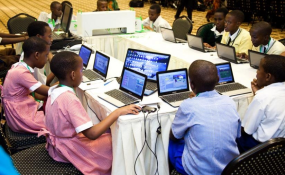África/Mayo de 2017/Autor: Julius Bizimungu/Fuente: All Africa
Resumen: Internet es una herramienta de recursos que puede mejorar y transformar el sector de la educación en África y contribuir a la transformación económica de las naciones africanas, indica un nuevo estudio de la Sociedad de Internet. El estudio, cuyos resultados fueron publicados ayer en el Diálogo Regional Africano sobre Desarrollo y Internet de dos días en Kigali, acaba de mostrar que Internet ofrece una oportunidad para abordar las necesidades de aprendizaje de diversos grupos en África, incluyendo el grueso de los estudiantes que estan actualmente fuera de la escuela. El estudio dice que un ambiente de aprendizaje combinado que aprovecha Internet puede potencialmente ayudar a conectar la educación con el trabajo, mejorar las habilidades que permiten a los jóvenes acceder al empleo, capacitar a los aprendices de por vida y, lo que es más importante, apoyar a las mujeres, las niñas y Las personas con discapacidad a participar en el aprendizaje sin espacio, tiempo y otras barreras culturales y sociales.
The internet is a resourceful tool that can improve and transform Africa’s education sector and contribute to economic transformation of African nations, a new study by the Internet Society indicates.
The study, whose results were released during the just-concluded two-day African Regional Internet and Development Dialogue in Kigali, yesterday, shows that internet offers an opportunity for addressing the learning needs of diverse groups in Africa, including the bulk of learners that are currently out of school.
Dubbed the «Internet for Education in Africa,» the study says a blended learning environment that leverages internet can potentially help connect education to work, improve the skills that allow youth to access employment, empower lifelong learners, and importantly, support women, girls and disabled people to participate in learning without space, time and other cultural and social barriers.
Blended learning is an education system that combines online digital media with traditional classroom methods.
«The participation in the global economy is now dependent on 21st century skills, which includes the ability to navigate in the digital world. Progress in countries like India, China and South Korea shows that connectivity serves as a foundation for access to information economy jobs and advancing innovations,» it says.
The study shows that in Africa, using internet for learning is a real possibility. More than a quarter of the African population (334 million) has access to internet, the majority of which are young people.
There were 147 million Facebook users in Africa as of June 2016.
However, such access to internet and use of social media has not been harnessed systematically to advance education and learning at individual and institutional levels, the study says.
Internet for learning
Dr Lishan Adam, one of the lead researchers behind the study, said it was also part of reviewing the position of Africa in global education commitments.
«As internet is growing, educational challenges are advancing and normally the two are not supposed to be intersecting. What we are trying to do is to look at where we are in terms of providing access to quality education, which is in line with the global education commitments under Sustainable Development Goal (SDG) 4,» he said.
The education targets of the SDGs, among others, aim to ensure universal pre-primary, primary and secondary education, achieve gender equity among learners, ensure disabled learners attain equal education, and foster youth employability.
To achieve this, Adam reckons that improved connectivity in the region and the vast learning resources that are available over the internet are useful.
Fuente: http://allafrica.com/stories/201705110056.html






 Users Today : 81
Users Today : 81 Total Users : 35459547
Total Users : 35459547 Views Today : 125
Views Today : 125 Total views : 3417883
Total views : 3417883